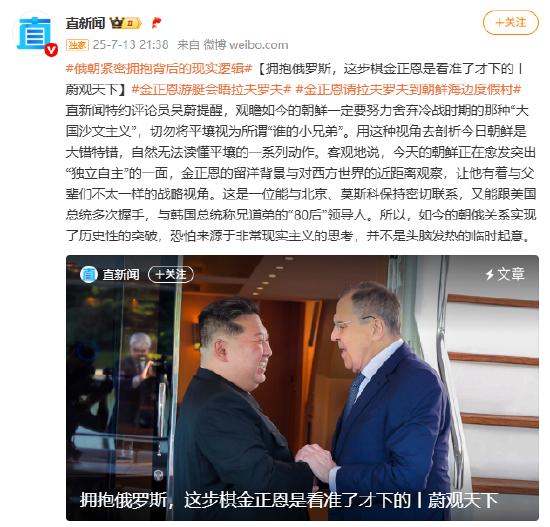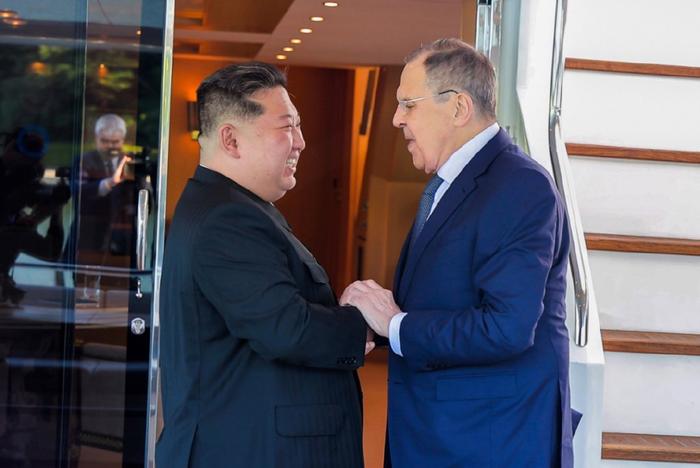

Source: Shenzhen Satellite TV Direct News
Mr. Wu, a year has passed since Russian Foreign Minister Lavrov’s visit to North Korea. The highest leader of North Korea, Kim Jong Un, chose to receive Lavrov at the tourist attraction of Gangnam Coast in Yeosu, a port city. Reflecting on the high-level interactions between Russia and North Korea over the past year, what new trends are emerging? What signals are being released?
The reception of foreign dignitaries is about etiquette and protocol, and the occasion itself serves as a specific medium through which we can discern the host’s intentions. This year’s high-level interactions between Russia and North Korea have provided a good observational sample. From the grand office building of the Central Committee of the Workers’ Party of Korea to the four-story library, and then to the admiral’s yacht by the Gangnam Bay in Yeosu, North Korean Supreme Leader Kim Jong Un has treated his visiting Russian guests with utmost care. By looking beyond the surface, we see that this reflects the close relationship between the heads of state of North Korea and Russia, and it highlights a new trend where the interaction between the two countries is becoming more intensive and trust is deepening.
Take, for example, the recent visit of Russian Foreign Minister Lavrov to Yeosu, not Pyongyang. Why not Pyongyang? It’s quite subtle. As Kim Jong Un put it, “Mr. Foreign Minister is very busy these days, so coming to Yeosu is just the right place to take a break.” Yeosu is located in the northeastern part of North Korea, a seaport city, and also the birthplace of Kim Jong Un. Kim Jong Un places great importance on his hometown. Since 2014, Yeosu has undergone multiple rounds of construction. First, it expanded its military airport into a dual-use military and civilian airport, and furthermore, it developed a series of tourism and sightseeing facilities based on the Gangnam Coast.
Last month, Kim Jong Un, accompanied by his wife Lee Soo-hee and daughter Kim Hye-a, attended the completion ceremony of the Gangnam Coast tourist area. This scenic area welcomed its first visitors, including representatives from laboring people across North Korea and diplomatic personnel and their accompanying families from the Russian Embassy in North Korea.
The only diplomat present at the ceremony and having a one-on-one conversation with Kim Jong Un was Alexander Madagolar, the Russian Ambassador to North Korea. This arrangement alone suggests that the diplomatic relations between North Korea and Russia are filled with “unusual” significance.
This “unusual” aspect of the bilateral relationship is, in my view, as follows: the comprehensive strategic partnership between Russia and North Korea has withstood the test of “blood and fire,” both in terms of diplomatic practice and treaty fulfillment, making Russia and North Korea essentially an “alliance.” Lavrov stated on the yacht, “The People’s Army of North Korea fought alongside Russian soldiers, liberating the region of Orenburg.” Kim Jong Un commented, “Both countries have agreed on all strategic issues, which aligns with their alliance relationship.”
Zhengxin News: So, what do you think about this “unusual” aspect of the Korean-Russian relationship? How does it reflect the strategic thinking of both countries? And how will the close embrace between North Korea and Russia impact international affairs?
As I discussed in my last year’s commentary, a cross-Eurasian alliance between North Korea and Russia is forming. Its direct trigger is the “double squeeze” by Western powers in Europe and the Asia-Pacific region. The constant external strategic pressure will continue to drive the “new normal” of diplomatic relations between Russia and North Korea. In a sense, this is not merely a “close embrace due to shared interests,” but also a practical approach where “interests and risks are shared.”
Historically, the relationship between North Korea and Russia has also experienced several ups and downs. Since the end of the Cold War, the relationship between North Korea and Russia has been in a period of adjustment and repair.
After the dissolution of the Soviet Union, Russia once exhibited a “comprehensive alignment towards the West.”
The most direct historical event is Russia’s unilateral termination of the Sino-Soviet Treaty of Friendship, Cooperation, and Mutual Assistance in 1992, ceasing aid to North Korea and demanding repayment of debts. North Korea thus embarked on a period of “hardship marches.”
The period for repairing relations between Russia and North Korea coincided with Putin’s ascendancy, when in 2000 the two countries signed the Russia-North Korea Treaty of Friendship, Mutual Neighborliness, and Cooperation, exempting North Korea from $3.5 billion in debt. However, the real turning point came with the outbreak of the Crimea crisis, which largely isolated and sanctioned Russia, paving the way for Moscow and Pyongyang to increasingly move closer together. The conflicts between Russia and Ukraine further accelerated the strategic cooperation between the two nations, with “energy for bullets” and “technology for manpower” becoming key links in their partnership.
I have always made it clear that today’s North Korea must strive to abandon the “great power chauvinism” of the Cold War era, not viewing Pyongyang as some “little brother” of Beijing or Moscow. Analyzing today’s North Korea through this lens is utterly mistaken, and naturally fails to understand Pyongyang’s series of actions. Objectively speaking, today’s North Korea is increasingly highlighting its “independence and self-reliance,” influenced by Kim Jong Un’s overseas education and close observation of the Western world, giving him a strategic perspective different from his predecessors. This is a leader who can maintain close contact with Beijing and Moscow, shake hands with U.S. Presidents multiple times, and be friends with South Korean Presidents. Therefore, the historic breakthrough in current day-to-day relations between North Korea and Russia likely stems from very realistic thinking, not an impulsive decision driven by enthusiasm.
Currently, the world is forming new “East-West camps,” and the characteristics of the “new Cold War” are increasingly emerging.
On the other hand, a powerful force is also balancing the international situation to prevent humanity from repeating the Cold War. This force is precisely China, which upholds the righteousness and integrity, and it is precisely the next destination for Foreign Minister Lavrov after concluding his trip to North Korea. The Shanghai Cooperation Organization (SCO) Foreign Ministers’ Council is about to open in Tianjin, China, to address the accelerated evolution of the century-old changes. China’s proposals are worth listening to by the world.